The “reimagined” version of Battlestar Galactica is easily the best Science Fiction show of the past decade. At its peak, it was one of the best shows on all of television. It combined the excitement of space adventure with the human drama of the day-to-day coping of a people without a home, as well as social commentary about religion, politics, and society writ large. After this tremendous build over four seasons, the creators of Battlestar Galactica had a tall order to properly wrap up the series. With so many mysteries and plot twists and burning issues to settle, the final episode of BSG tried not only to reach a satisfying conclusion, but to provide answers. Unfortunately, it left me with the following seven rather significant questions.
Note: This should go without saying, but this article contains boatloads of spoilers for the entire run of Battlestar Galactica. If you have not seen the show, do yourself a favor and watch it rather than letting me spoil things for you.
 1. Why would everyone give up technology?
1. Why would everyone give up technology?
Apollo’s suggestion that an entire civilization of nearly forty-thousand people give up all technology is a pretty radical one. The show hand-waves this issue with a statement about what people will do for a clean slate, but it feels like a cheat. This is a group of people who have lived with advanced technology their entire lives. Are we really to believe that the every last member of the fleet shares Apollo’s vision for a pastoral life?
First of all, this is the same group of people who were ravenously attempting to strip Galactica of all its technological goodies the second they realized it would no longer be in service. They’re the people who rioted and used violence when food supplies were running low. Now they’re all willing to be farmers? How do you turn this pack of humans who have repeatedly been shown as fighting over their creature comforts into the Amish country?
Secondly, one of the best parts of BSG was how the show’s creators repeatedly confronted the issue of dissent among the fleet. They consistently went out of their way to show that not every decision was popular, and that many resulted in a great deal of controversy and resistance throughout the remaining human population. There has always been a variety of opinions represented on the show, and that’s one of the aspects that added realism to a series about spacemen fleeing killer robots. Case-in-point – the finale is only few episodes removed from a large-scale mutiny. How is it that tens of thousands of people are suddenly all in agreement on something as drastic as forgoing all of their civilization’s technological advancements?
What many fans love about BSG is the realistic bent it takes toward the rigors of balancing democratic values and the need for survival in governing a large group of people. The finale throws this out the window. It’s hard-to-swallow that the same fleet that showed a diversity of opinion on a multitude of topics both major and minor would buy this company line wholesale.
 2. What the hell is Kara “Starbuck” Thrace?
2. What the hell is Kara “Starbuck” Thrace?
One of the biggest mysteries of the fourth season of Battlestar Galactica was who, or what, the returning Kara “Starbuck” Thrace is. After Apollo sees her ship explode, Starbuck is presumed dead, and she is mourned by her friends and compatriots. Then, two months later, she shows up out of nowhere in a mysteriously brand new viper, spunky and boisterous as ever. This improbable series of events leads the crew, and the audience, to wonder: Is she a human? Is she a Cylon? Is she something else entirely?
The show stoked the flames of this mystery. The “Previously on Battlestar Galactica” segments often featured Kara asking “What am I? A ghost? A demon?” It shows Starbuck seemingly having found her earthly remains, with a positive DNA match to boot. In the episodes following her return, Starbuck has a psychic sense about where to find Earth; she sees visions of her dead father, and she even remembers a song that ends up leading the way to the fleet’s new home. The Cylon Leoben had intimated for years that Starbuck had a “special destiny,” but just who or what is she?
The show never tells us. In the series finale, all we get is her statement to Apollo that she thinks she’s completed her mission and that it feels good. Then she disappears into thin air. No explanation. No exposition. Nothing. Was she, as Leoben theorized, an angel? Was she an instrument of God? Did she, as hybridized Anders seemed to indicate, cross over to the other side?
Good luck looking for answers. No show can resolve every plot point ever raised in the entirety of the series run. This is particularly true for a series like BSG that was filled to the brim with twists and mysteries. The nature of Kara’s identity, however, was one of the central foci of the fourth season. This was the endpoint of the character arc for one of the show’s main leads and one of its most beloved personalities. Perhaps the show’s creators did not want to spell everything out, but why not add in at least a few more details about what she was and why she was sent back? She’s only one of the coolest, most significant characters in the series.
 3. Why is no one worried about the other bad Cylons out there?
3. Why is no one worried about the other bad Cylons out there?
So “The Colony” is accidentally destroyed. Great! Plus the evil Cylons that are on board Galactica are all dead too. Swell! The Cylon threat is destroyed and we can just live our technophobic carefree lifestyle on Earth forever! Huzzah!
There’s just one problem – what about the other Cylon base ships out there containing missiles, nuclear weapons and a pack of angry Cylons still hell-bent on revenge? Were all of the base ships back at the colony for some reason? Surely Cavil has more than a few copies zigzagging the galaxy searching for the fleet.
As far as we know, the evil Cylons are still out there – hunting for the survivors and ready to destroy them at the drop of a hat. Why is everyone so blithely willing to treat this like a pure victory and destroy or give away humanity’s only means of defense or escape?
Maybe it would be hard for the bad guys to find Earth, but if the Final Five are any indication, they have plenty of time to keep looking. At least with New Caprica, there was a nearby nebula that made DRADIS hard to use, providing some measure of protection from discovery. Earth has no such safe harbors. Nobody bothered to keep a few vipers and raptors around and keep a patrol going just in case? The colonists on Earth are essentially sitting ducks. No one seems to be the least bit concerned about this and I have no clue why.
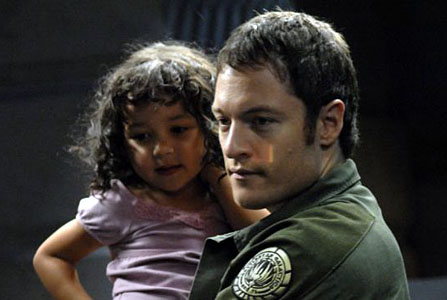 4. Did Hera procreate with a caveman?
4. Did Hera procreate with a caveman?
So Hera is “Mitochondreal Eve.” Even though that probably doesn’t mean what the creators seem to think it does, the implication is clear. Hera is meant to be the primogenitor of all of modern day humanity. It at least indicates that all human mitochondria come from her. There’s only one problem with that – it implies that she or one of her early descendants took a caveman lover.
Think about that for a moment. When the crew of Galactica finds a few early homosapiens, they do not even have language yet. Sure, Colonial Humans and Earth Humans are genetically compatible, but one is a civilization that built starships and traveled across the galaxy, and the other is one that fashions spears and crosses the landscape in loincloths. There’s a reason that the Star Trek universe has the prime directive to prevent the Kirks and Rikers of the galaxy from enjoying a little Friday Night hominid.
The end result leaves us with two possibilities. The first is that Hera or one of her offspring took advantage of a caveman who did not understand her language, let alone consent, and produced a child. The second is that nobody copulated with the natives, but rather the Colonial Humans completely supplanted the native humans on Earth. Whether you go with Neanderthal love or genetic obsolescence, neither choice is particularly pleasant.
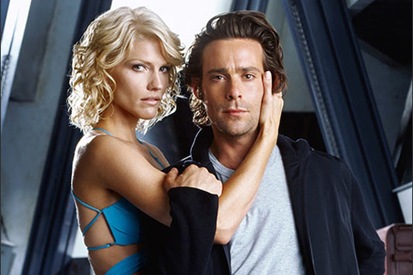 5. Do god’s angels lust after mortal beings?
5. Do god’s angels lust after mortal beings?
When the finale rolled around, the show’s creators resolved one of the foundational mysteries of the series. Namely, what’s the story behind the people who only Gaius Baltar and Caprica Six can see? After seasons of teases and red herrings, the ending reveals that they are not merely hallucinations from a troubled subconscious nor the result of a microchip implanted in Baltar’s brain. Instead, they’re real beings with an entirely separate existence.
They identify themselves as literal “angels of god.” This explains their ability to appear to only a select few, their knowledge of otherwise unknowable details, and their particular religious focus. I can’t say I loved this reveal; it’s a bit problematic when you have to rely on magical powers to resolve a major plot point, but it’s still a solid resolution of one of the show’s central questions. There’s only one nagging question with all of this – what’s up with their carnal interest in mortal beings?
The Angelic Six is shown constantly engaging in some pretty risqué acts with Baltar during the trip. From grabbing him during important meetings to full-on…ascension to Heaven, Angelic Six gets pretty dirty for one of God’s messengers. Starbuck even walks in on Baltar and, unbeknownst to her, Angelic Six, copulating in his laboratory (with a delightfully awkward aftermath). This wasn’t the first time this had happened between Gaius and his erstwhile hallucination, and it wouldn’t be the last in the series.
So what’s the deal? Do god’s angels realize that Gaius is a sleazebag and appealing to his libido is the only way to get through to him? Why did Angelic Six occasionally seem jealous when Gaius was with other women? Do beings on a higher plane of existence still need their physical fix now and then in the BSG universe? It’s all just a little odd in retrospect.
 6. What happened to Galen Tyrol?
6. What happened to Galen Tyrol?
Galen Tyrol got one of the worst lots in all of Battlestar Galactica. First it turns out that the woman he loves is a Cylon. Then she gets killed just when he starts to resolve his feelings toward her. Then a twin with her memories shows up, but is in love with another man. Then he narrowly escapes a death sentence. Then he has recurring dreams where he’s committing suicide. Then he has a tumultuous marriage with the woman who killed his former love. Then he finds out that he’s a Cylon. Then he thinks his wife committed suicide. Then he finds out she was sleeping with another man and that he’s not the father of the child he’d been raising. Then his former love comes back, only to dupe him into helping her abscond with a child. Finally, he discovers that his wife was actual killed by one of his fellow “Final Five” Cylons. It’s a pretty rough go, to say the least.
When we last see Chief Tyrol, he’s just discovered that it was Tory, a fellow Cylon, who killed his wife. He responds to this information by strangling her to death. This interrupted a transmission of the resurrection instructions to the evil Cylons, ending a short-lived armistice, and throwing the whole ship into chaos. It’s a big moment for one of the most notable characters on the show.
So what’s next for Tyrol? Does he face any repercussions for killing someone who was ostensibly on the side of the good guys? Does he have to struggle to convince other Cylons that his murder of one of the “Final Five” was justified? Will he face a trial? What are his plans on Earth? What’s going through the mind of one of the show’s most interesting characters?
If you watched the regular version of the episode, you have no idea. There are no scenes depicting the aftermath. There’s no discussion about where he’ll be going or what he’ll be doing on Earth. There’s no exploration of his state of mind after all of this whatsoever. If you watched the extended version, or a deleted scene, you learn that he wants to go live at an uninhabited island, hinted to be Scotland or thereabouts, but that’s it. The Chief was there from the very beginning and has played pivotal roles at many points in the show. His story and character deserve more than a meager sendoff that landed on the cutting room floor. I’m starting to think the show’s creators just don’t like him.
 7. What about Lampkin’s cat and dog?
7. What about Lampkin’s cat and dog?
I admit, this is an incredibly minor point. but it brings up a bigger problem with the ending. Gaius Baltar notes that the odds of genetically compatible humans evolving independently on different planets thousands of light-years away are “astronomical.” He uses this as evidence that a higher power is at work. It makes sense. How else can they explain a civilization finding its species-twin halfway across the galaxy?
There’s just one kicker – apparently the God of the BSG Universe loves cats and dogs as much as he loves humans. At least he sees them as equally worthy of survival. Clearly both felines and canines existed on Caprica, since Romo Lampkin (Gaius Baltar’s lawyer) has owned both. This means that if the planet the fleet finds is really the precursor to our own, then not only did this very active BSG God create a parallel species of humans, but he created parallel ancestors for cats and dogs as well.
Admiral Adama notes that Earth has “more wildlife than all twelve colonies put together.” So why the repeats? Why have a planet that has not only the same type of humans, but their pets as well? Are puppies and kittens just an essential part of any planet’s ecosystem? Was Romo Lampkin the man behind the domestication of wolves ? It just seems pointless or at least random.
And therein lies the frustrating part of this finale. All the struggles, all the mysteries, all the trials and tribulations we watched these characters go through amount to an explanation of “God did it.” As Lucy Lawless’s involvement in the series portends, this answer isn’t much more satisfying than “a wizard did it.” Every niggling detail has to be chalked up to some sort of divine plan, and the show’s very human creators simply do not have the capacity to live up to these lofty standards.
At the end of the day, Battlestar Galactica, despite its fantastical setting, was a very human show that depicted the down-to-earth problems of refugees at war, scraping by and searching for a safe place to settle. Chalking up that entire quest to a supernatural guiding hand not only makes those little discrepancies all the more puzzling, but it removes the agency from that struggle. The fleet, and the audience, deserved better.
If you enjoyed this article, you might also enjoy Would You Recommend Battlestar Galactica to a Friend? Reflecting on the Series Through the Lens of its Finale and The 5 Greatest Captains in Outer Space.

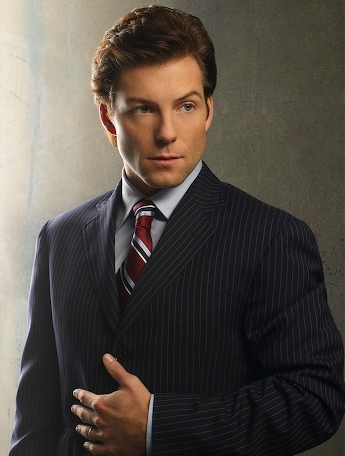



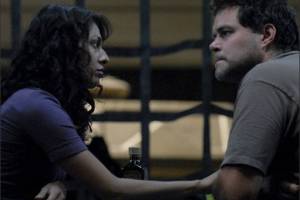
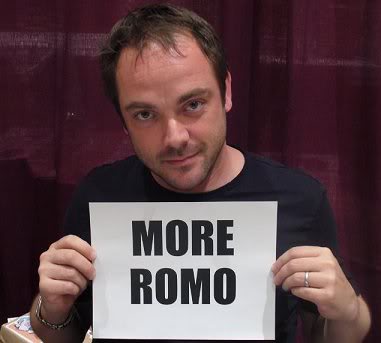
Pingback: Anonymous